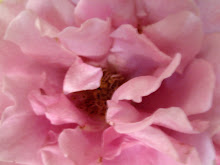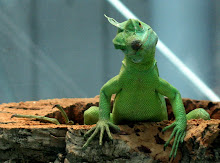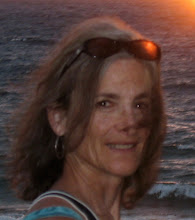
The shock of seeing him the way he looked then—so thin and fragile, is something that haunts me still. It was difficult to even touch him. I was afraid I would bruise him, hurt him somehow. It was as if he were made of thin, delicate rice paper, and that he was hollow inside--like a paper lantern that floats effortlessly in the afternoon breeze. I feared crushing him.
He spoke to me conspiratorially about how they were rounding up all the Jews and he wanted to know how in the world I had gotten in. I told him it wasn’t like that anymore, that the world had changed and that Jews were safe in
We called my mother using my cell phone. If he had ever used one before, he made no appearance of it. After I had said a few words to her, I held the phone to his ear. He was delighted, just knowing she was on the phone. “Josette, your sister is here.” he said, smiling. My mother doesn’t have a sister.
When my mother entered the room about a half hour later, his eyes lit up—at least as much as they had when he saw me. “The belle of the ball,” he said. “Look at her.” She later told me that in the late afternoons when she would say goodbye before heading home, he would often blame her for leaving so soon. “You’re off to go dancing with your boyfriend.” he would say. But sometimes he simply said, “Please take me with you. I don’t want to stay here.” That was difficult. Because she wanted to.
He asked me what my father did for a living. I smiled and told him he knew perfectly well what my father did. He reminisced about an aunt I was supposed to remember, but didn’t. He was wearing a fleece vest I had purchased for him, a vest that he had pulled out of the closet that morning—on his own. I doubted that he realized it was me who had purchased it for him. I wanted him to know. My mother, as if sensing that, reminded him.
Eating was a struggle. And with him being as thin and weak as he was, it was important for him to eat. Both my mother and the nurse were urging him to eat. And now me. The food looked terrible. He didn’t want it, and what made it worse is that nearly every bite or swallow led to hideous coughing and choking. He asked for water, which the nurse explained would make him choke even more. I’m sure this scene had gone on before all too frequently. Finally someone brought him a small paper cup of water to which she added a powder that acted as a thickener so that he could swallow it more easily, without choking. He drank what amounted to a teaspoon or two. And then he looked at me like his very old friend and confided, “All I want is a drink of cool water.” He drew out the vowels in the word “cool” as if savoring the thought of it. I couldn’t hold it in any longer. The tears that had been there from the moment I first saw him were beyond my ability to hold back.
“Oh God, I’m choking on something,” I explained feebly, smiling through my tears. I got up and headed towards his bathroom, coughing several times as if trying to dislodge something. In his bathroom, still coughing, I ran some water in the sink. I looked at myself in the bathroom mirror. My eyeliner was a bit smeared so I rubbed some of it off with my fingers. I saw the reflection of his bed in the mirror. The room was a dull wash of beige and white, accented by a streak of white sunshine that highlighted the particles of dust dancing above his bed. He would die here.
His face, which had been so handsome and strong, was now gaunt and feeble. A mean trick of time. If only I could reverse it. I thought of when his coming home meant hugs and laughter and sometimes even presents. I smiled, remembering. He taught me about honesty, about not taking things for granted, about not making assumptions. He taught me about driving defensively and thinking about the poor. He taught me about saving for a rainy day. He taught me about conscience.
But our ideas diverged. I was liberally minded and a free spirit. He was a child of immigrants. I was a child of a regional district manager for a highly successful retail chain. I had my own ideas, and he held on to his.
But on this day—when I watched his pained existence, I knew full well that all he wanted, even more than the cool drink of water, was a ticket out. And I wanted to give it to him.
When I hugged him goodbye, careful so as not to crumple him, I’m sure he knew it would be the last time. He looked at me as if he were seeing all the me’s that had been since the day I was born. It only took a few seconds, but I’m sure that he saw all that. And I saw the face of the man I had loved all my life, even though I’d forgotten about it for awhile.
“Goodbye, dad,” I said. He held me very tight and didn’t say anything at all. He didn’t have to.
A few weeks after he died, I had a wonderful dream. My dad, looking exactly as he had when I was sixteen and he was in his mid fifties, was standing in a room smiling at me. He wore a white suit and stood very tall and proud. His silver grey hair was slickly combed back. He was strikingly 
“I’ve been dancing. I’m happy now,” he announced—his sea green eyes flashing and that smile that swept my mom off her feet the first time she laid eyes on him in
I smiled back. There was nothing that needed to be said. I knew he was all right and he’d come back to tell me. Must be because he wanted to let me know—like he always had, that everything was all right.






